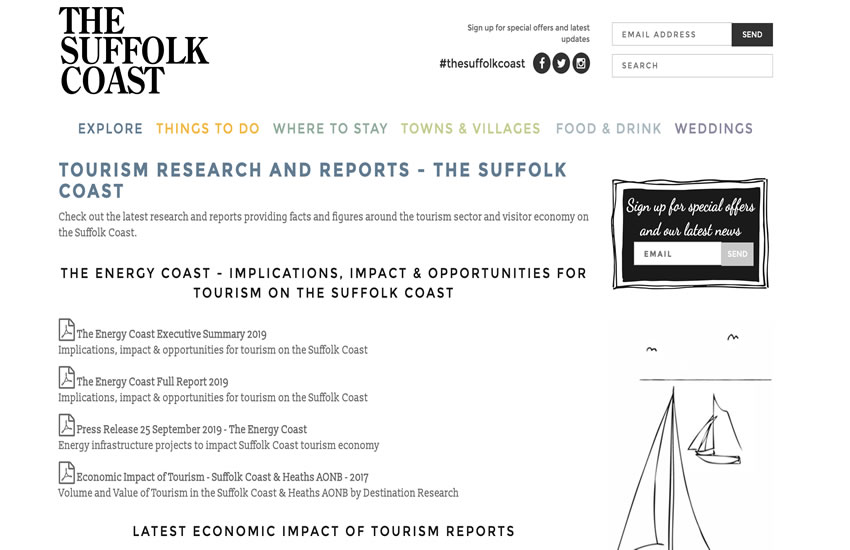Suffolk Tourism DMO - Tourism Businesses Very Worried About Energy Proposals
The Suffolk Coast DMO, an independent body that represents numerous businesses and many tourism accommodation businesses located in the Suffolk Coastal corridor have recently surveyed businesses and visitors about the energy proposals along the Suffolk Coast. Their report is now available and it makes scary reading if you work in tourism, own or manage a tourism/hospitality business here.
The figures quoted are estimates, however many businesses fear the financial impacts could be much, much worse with the knock-on effects impacting on many businesses including both independent and managed self-catering accommodation, hotels, restaurants, pubs & cafes as well as shops, and other businesses.
PRESS RELEASE from The Suffolk Coast DMO – 25th September 2019
Energy Infrastructure Projects Will Damage Tourism Economy.
Plans for the development of new energy projects on the Suffolk coastline could impact the local visitor economy by up to £40m per year and could result in 400 job losses* according to research commissioned by The Suffolk Coast Destination Management Organisation (DMO).
The research has evaluated the potential impact of EDF Energy’s Sizewell C new nuclear power station and Scottish Power Renewables’ planned construction of onshore infrastructure connected to new coastal windfarms. If both projects go ahead, the construction phases are likely to overlap over the next 10 – 12 years.
Between £24m – £40m per annum could be lost to tourism within the Suffolk Coast & Heaths AONB during the construction of the two projects, according to a report carried out by leading consultants BVA BDRC, which assessed both day visits and overnight stays. This figure amounts to nearly 25% of direct spend within the AONB tourism area^.
The research also confirmed that the Suffolk Coast’s tranquil environment was its greatest asset, according to the survey of 1700 respondents.
“The survey’s findings are deeply concerning.” said Chair of The Suffolk Coast DMO Harry Young. “As the marketing body promoting the sector we believe it is essential that tourism businesses, stakeholders and politicians at a local and national level are aware of the damage these projects could cause to an essential part of the county’s economy.
“The headline figures, whilst significant, don’t tell the whole story, as most tourism businesses operate on tight margins in a challenging and competitive sector. Losing even 5% of their turnover could be very damaging for many of our members. This could lead to job losses as businesses would have to adjust to cope with reduced demand. The research tells us this may result in at least 400 full time equivalent jobs being lost in the area.
“Whilst we recognise the UK’s need for renewable energy we simply cannot ignore the risks to this sensitive geography, which is so reliant on tourism. The survey suggests that we could lose visitors who do not have a strong familiarity with the area, but have the Suffolk coast on their “bucket list” along with other UK coastal destinations. This is a vital segment of our market. If their perception of the area changes, we will have a huge challenge to replace them.
”The survey suggests that to protect existing markets and attract new visitors, significant investment will be needed to ensure the positive image of the Suffolk Coast brand is not overshadowed by construction projects.
The Suffolk Coast DMO urges both Scottish Power Renewables and EDF Energy to reconsider the extent of mitigation to both the environmental and traffic consequences of what they are planning in order to reduce the negative impact on tourism. The research does indicate that increasing awareness of the attractions of the area could draw new visitors and mitigate some of the impact.
“The Suffolk Coast is one of the jewels in the crown of the East of England visitor economy,” Said Dr Andy Wood, Chair of East of England Tourism and CEO of Adnams Plc. “Customers tell us that they value above all else the peace and tranquillity of the place. Two delicate eco-systems are at work here. The first and most obvious is the natural environment, second is a small business led economy where any loss of business could have a significant effect on individual businesses and damage the uniqueness of the Suffolk experience.
”The research, which has been published by the DMO today, highlights the following:• The Suffolk Coast is first and foremost perceived as a place to relax and escape in a natural setting with 84% of respondents considering a visit citing nature-related activities as their main reason for visiting the area.
• 29% of the regional market are less likely to visit during the construction phases of these projects
• 11% of those surveyed said they are “a lot less likely to visit”
• There is evidence that beyond the construction phase, some respondents were still significantly less likely to visit than before the work commenced
• The major areas of concern to the regional market are “loss of tranquillity, nature and unique charm” and “road and traffic problems”
• The majority of business respondents were in the accommodation sector. 72% of all businesses are either “fairly worried” or “very worried” about the developments. 75% of those already aware of the developments expect their turnover to decrease
• 43% of the regional market and 86% of businesses feel the branding of “The Energy Coast”would have a negative effect
• Although outnumbered by those less likely to visit, a small minority of respondents 3%suggested they would be a lot more likely to visit the Suffolk Coast during this period
For more details and to view the full report please visit https://www.thesuffolkcoast.co.uk/tourism-research-and-reports
– Ends –
Press contact: For more information please contact Pete Joyner or Chris Baines on 01603 706560 or emailpeterj@thissrl.co.uk
* Full time equivalent jobs
^In 2017 direct visitor spend was £164m.

